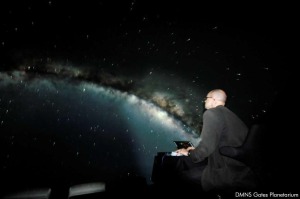
Photo: DMNS Gates Planetarium
Robert Henke of Monolake and one of the creators of Ableton live came through Denver and performed his work “Intersection” on Monday and then delivered a lecture at Denver University on Tuesday. This invitation only event was hosted by The Digital Media Studies program at the University of Denver.
This was a real treat as this was one of only a small number Robert’s performances in the US. Here is a show report.
MONOLAKE “INTERSECTION” CONCERT MONDAY SEPTEMBER 27TH, GATES PLANETARIUM
“Intersection” is a work which incorporates “field recordings made in Hanoi in 2009, reconstructed through narrative, music and sounds”. The performance was presented in the context of the amazing full-dome digital theater of the Gates Planetarium.
Before the show started the event host Trace Reddell, Ph.D. (Director, Digital Media Studies University of Denver) introduced Robert who talked a little bit about the piece and the show.
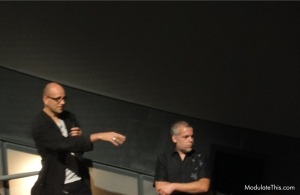
Robert described the show as a real-time collaboration between himself and Gate’s Planetarium’s own VJ / Pilot / Scientist Ka Chun Yu Ph.D. on visuals (pictured below).
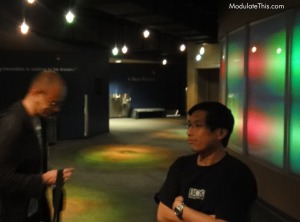
They had only met a few hours before the show and the concert was almost completely improvised.
Music and Sound
On the sound side of things, Robert describes “Intersection” as follows:
Intersection is entirely created using field recordings taken in November 2009 in and around the city of Hanoi in Vietnam. The field recordings were transferred to a laptop and layered, filtered, slowed down and processed in many ways to form the composition. The idea of using recordings of day by day sounds as material for musical expression is not new. It has been pioneered shortly after the advent of tape recorders in the late 1940 by the French composer Pierre Schaeffer and others. They coined the term ‘musique concrete’ for these kind of works.
Robert was using Ableton Live on a laptop along with a multi-channel sound card. He used the portable controller below to control fades, filtering and more. Of course, he was using Live to control clip playback. He mentioned using follow actions and I believe he was also using some of his custom Max for Live devices.
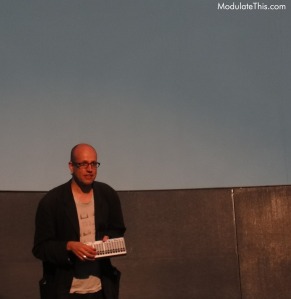
Visuals
The visuals were also done in real time by Dr. Yu using the Uniview visualization platform made by SCISS – www.scalingtheuniverse.com. According to Dr. Yu:
Uniview is a visualization of the known universe, with the ability to fly the user and audience through a virtual simulation at multiple size scales. We can thus start off around something at a human scale, and zoom out to the edge of the observable universe billions of light years away. For the performance the other night, Robert wanted the visuals to be slow and to evoke star fields.
Performance
Words can’t quite capture it, but here is a taste. The show started with almost a completely black dome. The music and star field slowly evolved and became more present. A bright star appeared, slowly moved across the dome then started coming towards us. As the star got closer it became a huge sphere or stars. Through time, we were brought into the center of the sphere which began to rotate. There was parallax-like against stars that were outside the sphere – then we tumbled. Awesome! This transition took like 15 minutes so it was quite serene most of the time.
Here is the show described from Dr. Yu’s point of view:
For the performance the other night, Robert wanted the visuals to be slow and to evoke star fields. We therefore started out in interstellar space far from the Sun, and moved in. We spent much of the time floating through the Oort cloud, a hypothetical spheroidal distribution of 2 trillion comets around the Sun. In the last part of the performance, we also zoomed inward to view the Kuiper Belt, a toroidal distribution of icy bodies just outside of Neptune’s orbit. And that was it — plus a fistful of tricks and changes in the viz parameters to make the dome imagery go beyond that of a typical science talk, and reflect Robert’s vision for the evening.
I’d describe the music as ambient, spatially dynamic, slowly evolving layers that come together in a complex way that your brain seems to make sense out of as your perception evolves along with the piece. An interesting mix of drones, metallic textures, with a few sounds that were almost familiar way in the back of the mix. All moving around in the 3-d space of the dome.
The combined visual audio experience demanded you calm your mind and senses a bit so you could properly take it in – and then you could get lost in it. Very immersive, and very nice!
As they were improvising, you could sense Robert and Dr. Yu reacting and playing off each others creations. Robert described it as a Jam.
The show which was around 45 minutes in length ended with a very slow fade to white and complete silence.
Robert ended the performance by saying “you are now only hearing the ambient noises of the planetarium”. Applause, then Q & A. Fantastic!
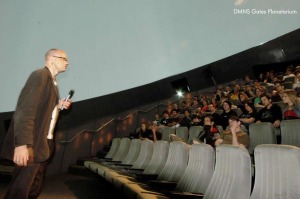
Photo: DMNS Gates Planetarium
Reception

Photo:Ableton Colorado Flickr Photo Stream
A reception followed at Forest Room 5 which was hosted by the Ableton Denver User’s group. I want to mention that attendees were a mix of students, academics, and artist. It was really nice to mingle and meet new people including Robert and the reception was a great way to build community.
ROBERT HENKE LECTURE – TUESDAY SEPTEMBER 28TH, UNIVERSITY OF DENVER 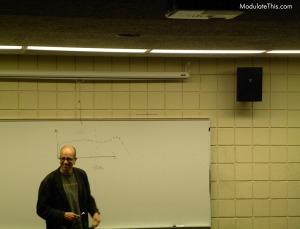
The Digital Media Studies program at the University of Denver hosted a second night with Robert Henke. This time it was a lecture on campus.
Robert came with no prepared material, and then gave an amazing one hour and forty five minute lecture! Instead of being some sort of pure technical lecture on electronic music or Ableton Live, Robert talked a lot about his creative process and journey as an artist which I personally found fascinating. As a speaker Robert was animated and passionate about his art and craft made a point to connected with the audience.
Below is a shot of him talking about some of his early work with a Budda Machine.
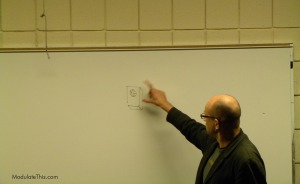
Robert touched on themes and topics such as:
- Creative Process.
- Applying an existing process to a new context to achieve a new result.
- Struggle, taking risks, and trusting in your own work and intuition in the creative process.
- Embracing the unpredictable nature of iterative creation and how you often end up with unlikely results (which can be a good thing).
- and MUCH more…
He discussed how he often prefers low cost portable digital field recorders as he ends up capturing more sound in the moment. He is currently organizing and naming field recordings by the name of the project or song rather than organizing like sounds together.
Another theme was the freedom and possibilities software-based tools have over hardware in certain contexts. For example, he discussed some ways to misuse Ableton Live by adding a number EQ’s in a chain to emulate the resonant frequency of a kick drum using only a simple “click” sound coming from Ableton Operator. The point being you have very few limitations in Live when compared to h
ardware and can simply keep piling on EQ’s in the chain. It was interesting to see Live used in such an unconventional way.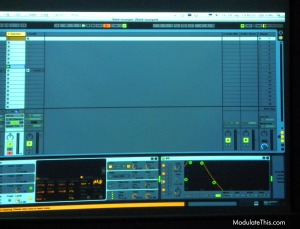
One very cool part of the lecture was when he demonstrated how he built a “wave guide model” using standard devices in Live. He then used racks to create instances to tune pitch for each note.
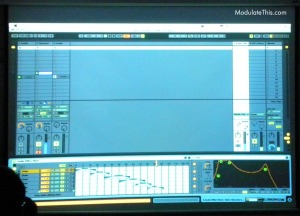
He also discussed the value in building your own devices in tools such as Max for Live. His point was that something special happens when you invest time in your own instrument and as a result you end up using it more, which then drives further iteration and enhancements, which then influences artistic results in unexpected ways. The other advantage is you can solve problems that relate specifically to your art and performances. He sited his use of his own devices such as his circular Doppler effect.
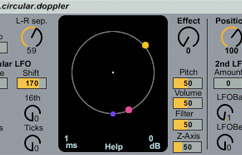
He was asked how he balances all this which lead him to relate some insights on working with deadlines and the importance of working environment and balancing coding with other aspects of artistic creation.
It was simply a great lecture and I felt very fortunate to get a glimpse into Robert’s creative process. One thing I really liked about this event was that it was structured for a smaller intimate lecture setting where we could meet Robert afterwards and personally thank him for the shows and for his contributions to our own art via Ableton Live.
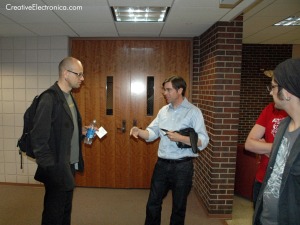
Photo: Creative Electronica
THANKS
It was a wonderful two days for sure and I want to personally thank:
- Robert Henke for taking the time out of his schedule to play and speak in Colorado.
- Dr. Ka Chun Yu (DMNS Gates Planetarium) for his performance on Monday.
- Dr. Trace Reddell (DMS) and Darwin Grosse (DMS & Cycling 74) for organizing such a fantastic set of events and including me and others from Ableton Denver Community.
- Dan Neafus (DMNS Gates Planetarium) for introducing me to Trace and for providing such a great venue for the concert and for sharing pictures with this post.
- Marc (Ableton Denver & Creative Electronica) for organizing the reception on Monday, gathering the Abes and sharing pictures for this post. Marc has shared even more photos on the Ableton Colorado Flickr Photo Stream.
Mark Mosher, Electronic Musician, Boulder, CO
www.ModulateThis.com
www.MarkMosherMusic.com



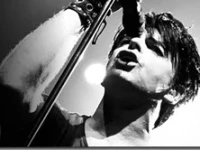
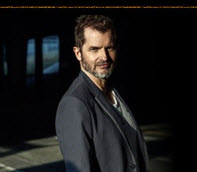

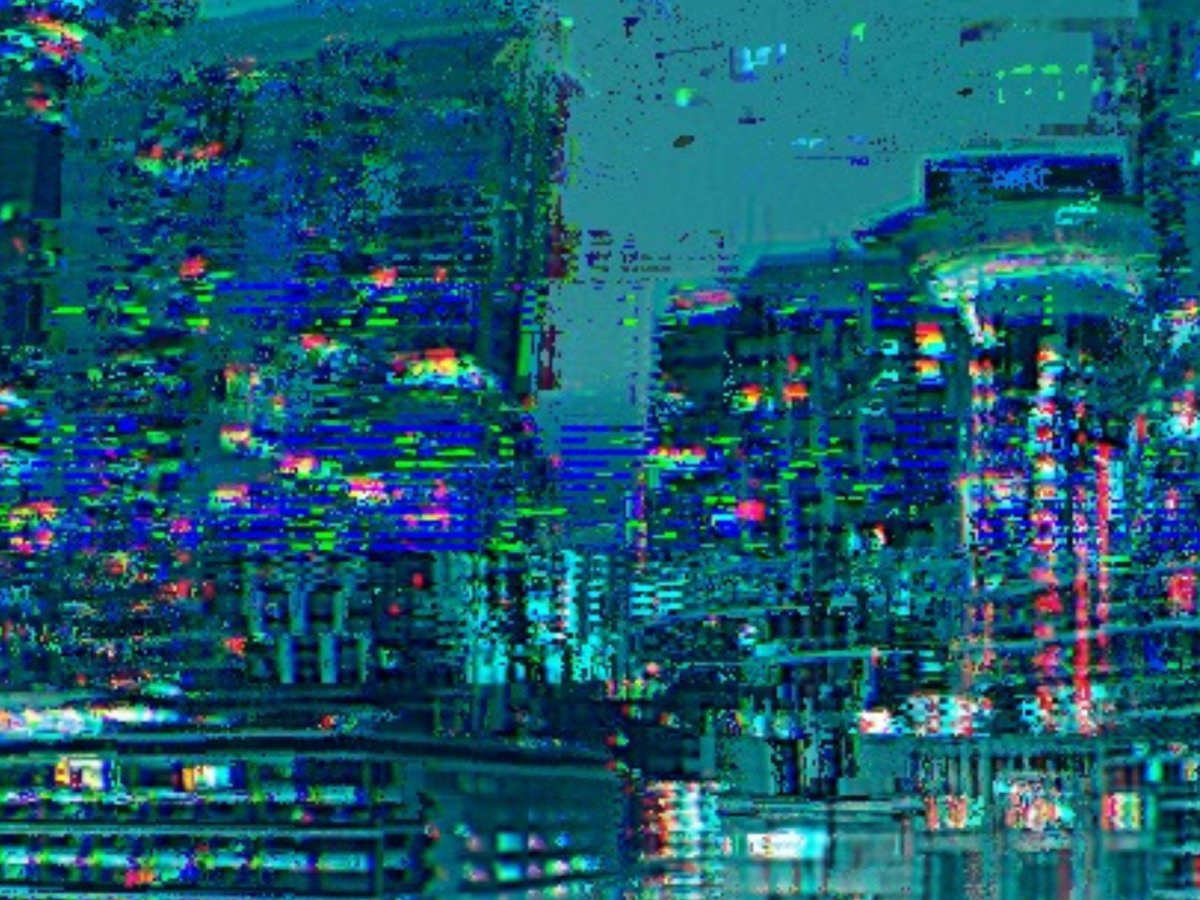
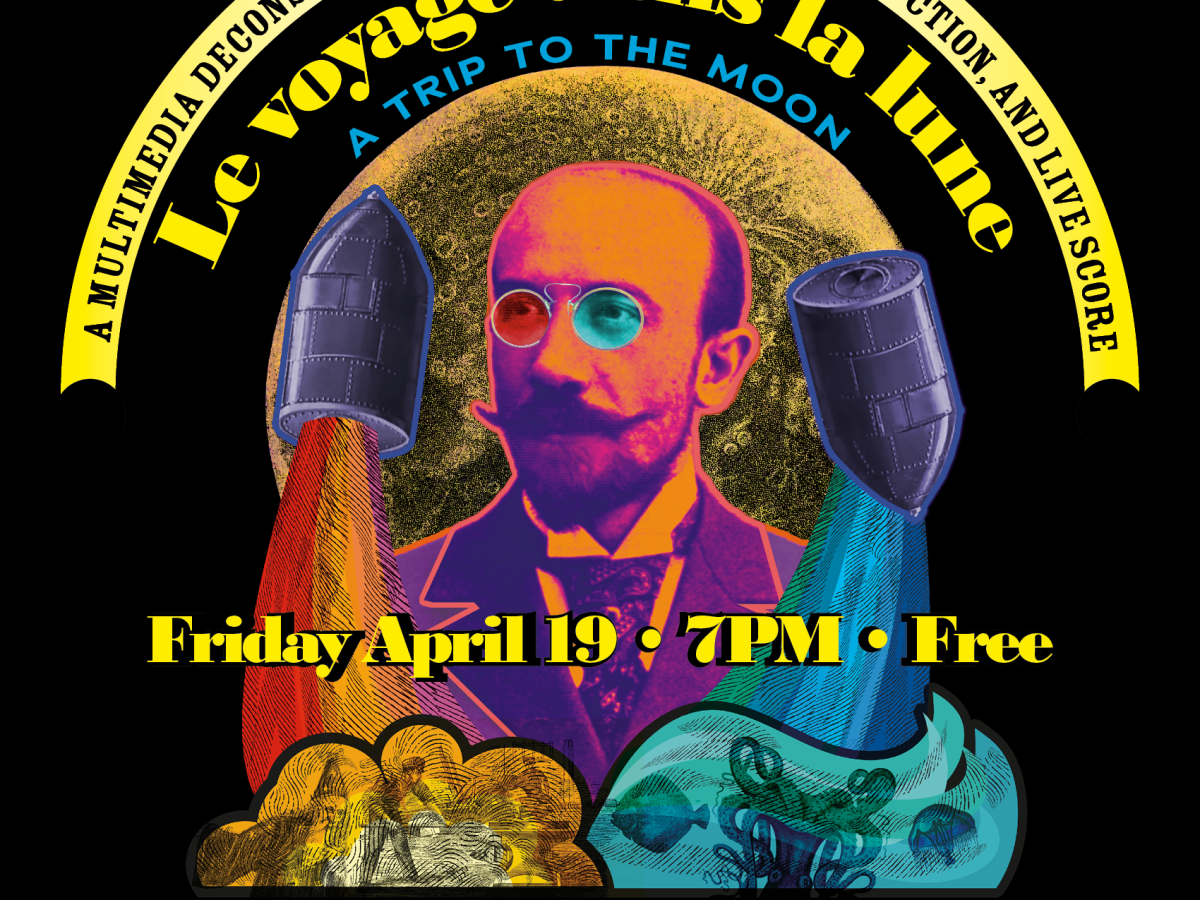












Leave a Comment